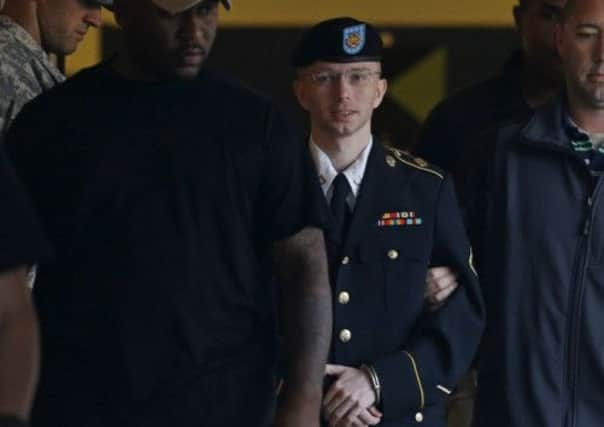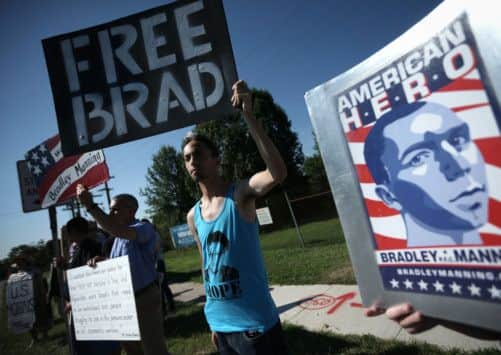Bradley Manning faces 136-year sentence for leak


But the judge who presided over the case acquitted Manning of the most serious charge against him, aiding the enemy.
The verdict, delivered last night, came more than three years after the 25-year-old was charged over the publication of around 700,000 secret diplomatic cables that appeared on the Wikileaks website.
Advertisement
Hide AdAdvertisement
Hide AdThe leak is believed to be the largest ever release of secret American government files. Colonel Denise Lind, the military judge, convicted him of five espionage counts, five theft charges, a computer fraud charge and other military infractions.


Col Lind’s decision was anxiously awaited by news organisations and civil liberties groups around the world which had expressed fears that a guilty verdict would discourage whistleblowing and jeopardise public interest journalism.
Last night, Julian Assange, the Wikileaks founder, attacked the verdict and hailed Manning as a “hero” who had helped trigger the Arab Spring.
Amnesty International welcomed the decision not to convict him of aiding the enemy. “There was no credible evidence of Manning’s intent to harm the US by releasing classified information,” it said.
The judge also found Manning not guilty of having leaked an encrypted copy of a video of a US air strike in the Farah province of Afghanistan. Up to 147 civilians died in what is believed to be the worst episode of its kind in the decade-long conflict.
Aiding and abetting the enemy would have resulted in an automatic life sentence without parole, although Manning is still likely to spend the rest of his life in prison. His sentencing will begin today.
Col Lind delivered her verdict in curt and pointed language, repeating; “Guilty, guilty, guilty, guilty,” over and over to the packed courtroom. The judge had deliberated for about 16 hours over three days before reaching her decision.
Supporters have hailed Manning as a whistleblower who uncovered information which some believed was in the public interest to publish. The US government, however, called him an anarchist computer hacker and attention-seeking traitor.
Advertisement
Hide AdAdvertisement
Hide AdManning’s trial was unusual in that he acknowledged giving Wikileaks more than 700,000 battlefield reports and diplomatic cables, plus video footage from Iraq in which airmen laughed and called targets “dead b******s”.
Manning pleaded guilty earlier this year to lesser offences that could have resulted in a prison sentence of 20 years, but the government continued to pursue the original charges.
Manning has said he leaked the material to expose the US military’s “bloodlust” and disregard for human life, and what he considered American diplomatic deceit.
He said he chose information he believed would not the harm the US, but wanted to start a debate on military and foreign policy. He did not testify at his trial.
His defence lawyer David Coombs portrayed Manning as a “young, naive but good-intentioned” soldier who was in emotional turmoil, partly because he was a gay service member at a time when homosexuals were barred from serving openly in the US military.
Mr Coombs said Manning could have sold the information or given it directly to the enemy, but he gave it to Wikileaks in an attempt to “spark reform” and provoke debate.
A counterintelligence witness valued the Iraq and Afghanistan war logs at about $5.7 million (£3.7m), based on what foreign intelligence services had paid in the past for similar information.
Mr Coombs said Manning had no way of knowing whether al-Qaeda would access the secret-revealing website, and a 2008 counter-intelligence report showed the government itself did not know much about it.
Advertisement
Hide AdAdvertisement
Hide AdThe lead prosecutor, Major Ashden Fein, said Manning knew the material would be seen by al-Qaeda, a key point prosecutors needed to prove to get an aiding the enemy conviction. Even Osama bin Laden had some of the digital files at his compound in Pakistan when he was killed, the prosecution argued.
The trial unfolded as another intelligence worker, Edward Snowden, revealed US secrets about surveillance programmes.
Snowden, a civilian, has told the Guardian his motives were similar to Manning’s, but he said his leaks were more selective.
Before Snowden, Manning’s case was the highest-profile espionage prosecution by the Obama administration, which has been criticised for its crackdown on whistleblowers.
The espionage cases brought since Mr Obama took office add up to more than all other presidencies combined.
The material Wikileaks began publishing in 2010 documented complaints of abuses against Iraqi detainees, a US tally of civilian deaths in Iraq and America’s weak support for the government of Tunisia – a disclosure that Manning supporters said helped trigger the Middle Eastern pro-democracy uprisings known as the Arab Spring.
The Obama administration said the release threatened to expose valuable military and diplomatic sources and strained America’s relations with other governments.
Prosecutors said during the trial that Manning relied on Wikileaks and Mr Assange for guidance on what secrets to “harvest”, starting within weeks of his arrival in Iraq in late 2009.
Advertisement
Hide AdAdvertisement
Hide AdLast night, Manning’s family issued a statement written by his aunt. It said “While we are obviously disappointed in today’s verdicts, we are happy that Judge Lind agreed with us that Brad never intended to help America’s enemies in any way. Brad loves his country and was proud to wear its uniform.”
Kristinn Hrafnsson, a Wikileaks spokesman, describing Manning as a “hero”. He claimed the judge had presided over a “show trial”.
Mr Assange, speaking from within the Ecudorian embassy where he has been living for over a year to avoid extradition to Sweden, said the only victim in the case had been the US government’s “wounded pride”.
“This was never a fair trial,” he said. He described the soldier as the best journalistic source the world had seen, uncovering war crimes in Iraq which he maintained had led to the removal of US troops from that country.
Background: Documents laid bare the secrets of US policy and views
DIPLOMATIC cables leaked by Bradley Manning had wider implications than the immediate security concerns for the United States, exposing questionable practices on the part of its diplomats and its actions in Iraq and Afghanistan.
The Apache gunship attack on unarmed civilians in July 2007 in which 12 unarmed civilians were killed in Baghdad exposed previously unreported “gun runs” in the capital. A further 14 were killed four days later in a similar incident.
Black-and-white footage filmed from the cockpit was released by Wikileaks and showed three incidents in which people were targeted as they walked along city streets.
Advertisement
Hide AdAdvertisement
Hide AdPilots are heard discussing the attack with a crewman heard laughing: “Ha, ha, ha – I hit ’em,” after opening fire, followed by a second man who says: “Look at those dead b******s.”
Diplomatic cables also revealed that Secretary of State Hillary Clinton, below, in 2009 ordered diplomats overseas and at the UN to collect personal information on foreign officials, including credit card information, frequent-flier numbers and fingerprint scans.
Other releases suggested that the Obama administration had secretly launched missile attacks on suspected terrorists in Yemen, with the Yemeni government claiming responsibility. Dozens of civilians along with some suspected terrorists were reportedly killed during the attacks.
Wikileaks also exposed a series of high-level discussions related to North Sea oil reserves and the release of the Lockerbie bomber.
It laid bare concerns at the highest level of government that the UK could be forced to rely on overseas imports for more than two thirds of its oil and gas supplies within ten years due to a “severe” decline in energy production.
The Scotsman first published in June 2011 a secret memo highlighting worries from the then energy minister Malcolm Wicks to a senior official in the US government in March 2008.
It warned that to address the energy deficit the UK would be forced to “ensure a diversity of supply” and that the country would have to buy oil and gas from nations such as Qatar and Norway, with which Britain had held talks.
It stated: “The UK will experience a severe decrease in North Sea gas and oil stocks by 2020, and will need to improve its diversity of supply as well as move towards ‘homegrown’ measures such as nuclear and renewables.”
Advertisement
Hide AdAdvertisement
Hide AdThe cables are at odds with estimates from experts at Aberdeen University, which suggest that although 40 billion barrels of oil and gas, have been used since the mid-1960s, there are now between 20 and 21 billion left, with upper estimate suggesting up to 35 billion barrels.
WikiLeaks cables also revealed a startling deal offered to Scotland which involved the transfer of Abdelbaset Ali Mohmed al-Megrahi, above right, the only man convicted for bombing of Pan Am Flight 103 in December 1988, to Switzerland.
Ministers in Edinburgh turned down the offer. It was believed the Swiss were attempting to mend bridges with Libya, after relations soured when Colonel Muammar Gaddafi’s son Hannibal and daughter-in-law Aline Skaf were held in Geneva in 2008 over alleged assault charges.
A third batch of cables revealed that the British government effectively gave up on its mission in Iraq, with defence secretary Des Browne, admitting privately that chaos in Basra was “depressing and incomprehensible”, and “could not be resolved … by the UK’s forces”.
American generals’ dismay at Britain’s attitude was also clear in the cables, as was their concerns that the withdrawal left the supply lines from Kuwait exposed during the “surge” in the Sunni triangle.US officials initially warned of dire consequences in the days immediately after the first disclosures in July 2010. But a Pentagon review later suggested those fears might have been overblown.
The judge in Manning’s case did not allow testimony during the trial phase on whether damage had been done, but both sides can present that kind of evidence during sentencing.
In addition to exposing these contentious issues, the release of diplomatic cables led to a series of arrests and the tightening of security in US intelligence.
Other military careers were ruined besides Manning’s with 15 people disciplined as the result of an army investigation into the affair, although they have never been named.
Advertisement
Hide AdAdvertisement
Hide AdThe Defence Department has also made it harder to download material from a classified network onto USB drives, CDs and other removable media. Manning brought a rewritable CD labelled “Lady Gaga”, top, to work, erased the music and downloaded government documents on to it.